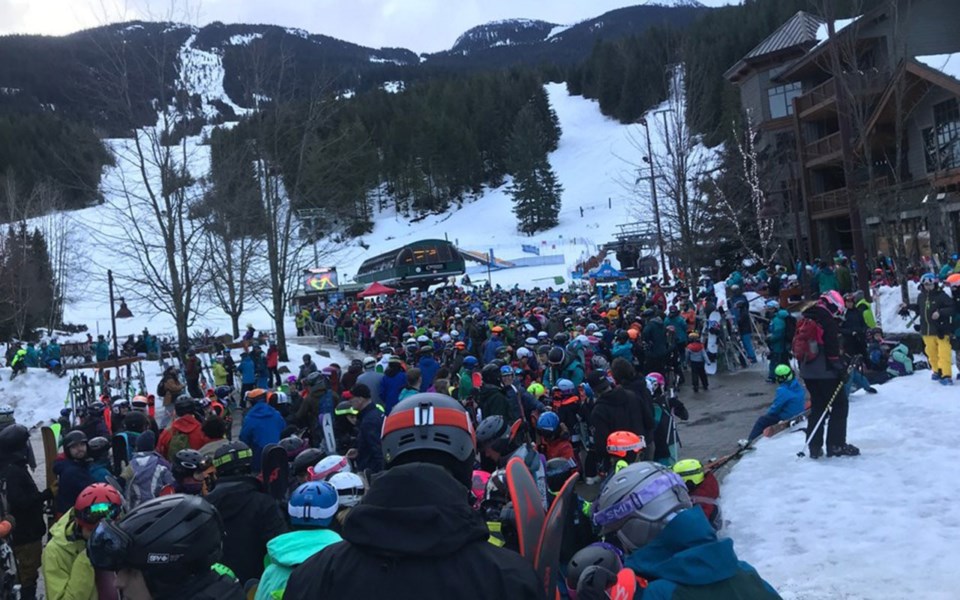Before the COVID-19 pandemic, it was not unusual to hear complaints of the impacts of overtourism in our region.
The weekend traffic on the Sea to Sky Highway was bumper to bumper, the lift lines, runs and restaurants were packed in the winter and the situation felt even worse in the summer months.
With our mountain resort nowhere near capacity, it seems crazy to imagine those concerns now—but perhaps we should.
After all, in a way, we have been given a chance to consider doing things differently as we move into this new tourism reality.
It’s really an unprecedented opportunity to examine how to rebuild our tourism industry in a way that benefits our economy and also protects our green environment and our community.
This month, Whistler is holding four townhall meetings—the first was this past Tuesday, while the second is today, July 16 (The environment: 5 to 6:30 p.m., co-hosted by Mike Douglas)—to talk about what we want to look like in the future.
“Our goal is to collaborate with the community on potential solutions to the challenges we face,” said Mayor Jack Crompton in explaining these meetings.
“Our challenges cannot be fixed unilaterally by the RMOW, or any level of government. This is an all-hands effort and it will take individuals, families, businesses, community groups and government to deliver a shared response that is up to the challenge.”
(Zoom details and registration information will be available at whistler.ca/communityconversations.)
We have been talking about this topic for some time and indeed, Pique’s columnists and reporters have touched on it in recent months as well. (Check out “Taking advantage of a hard reset” Pique, May 14, 2020, for example.)
It would be easy not to participate in the conversation, imagining that it is impossible to reframe what we do as a tourist mecca. But take heart, for we are not the only destination grappling with this dilemma and some pretty creative ideas have already been put on the table. Why can’t we do the same thing?
Obviously what is being done in Southeast Asia through education programs, a tourist tax, visitor caps, serious penalties being imposed for those who cannot comply with destination rules and regulations might not work for us.
But the fact that destinations are considering these pretty drastic steps is a sign that things must be done differently going forward.
As UN World Tourism Organization Secretary-General Zurab Pololikashvili said recently: “Sustainability must no longer be a niche part of tourism but must be the new norm for every part of our sector.
“It is in our hands to transform tourism and that emerging from COVID-19 becomes a turning point for sustainability.”
Consider Banff and Lake Louise, where tour buses now have to make reservations at destinations to avoid hours-long line-ups, and New Zealand, which in the last year has revamped its tourism strategy to focus on the long term, making “visitor-sustainability” a pillar of its approach. (The country has seen a 35-per-cent rise in visitor arrivals in the last five years.)
“The recent pace and scale of visitor growth has effectively outstripped the capacity of our system to respond in some areas. This means that the economic and other opportunities afforded by this growth are not being fully realised, and the pressures created are not always adequately managed,” states the New Zealand strategy, found at www.mbie.govt.nz/dmsdocument/5482-2019-new-zealand-aotearoa-government-tourism-strategy-pdf. Sound familiar?
Venice, which hosts 30 million annual visitors, provides one extreme example. The sheer mass of travellers is destroying the very fabric of the historical community there.
“The social ties Venice once enjoyed, its rhythm of life, even the vibrant artisanal trades, are now almost a thing of the past,” wrote Neal E Robbins, author of the just-released Venice, an Odyssey: Hope and Anger in the Iconic City.
Where 170,000 people lived there after the Second World War, only 52,000 call Venice home today. So now residents are demanding a reduction in cruise-ship traffic, a reduction in Airbnb bookings, and a system to manage tourist numbers.
In Amsterdam, meanwhile, a petition is circulating on the future of tourism there. It already has 23,000 signatures. If it reaches 27,000, it would trigger a referendum. The principal demand is for tourist numbers to be limited to 12 million overnight stays per year, a return to the “manageable” levels of 2014.
To do this, Amsterdam is looking at a total or partial ban on holiday rentals, no new hotels, stopping extensions (in rooms or beds) of all current hotels, increasing the tourist tax (if necessary) to limit the demand for overnight stays, assessing it every six months and using extra proceeds from the tax to counteract tourism problems and improve residents’ quality of life.
It is also considering creating a “councillor for tourism and quality of life.” Their duties would include maintaining the cap on overnight visitors and proposing measures that would improve conditions for residents.
So, as we take part in our townhalls on the Whistler we want to see, bring your creative ideas to the table.




